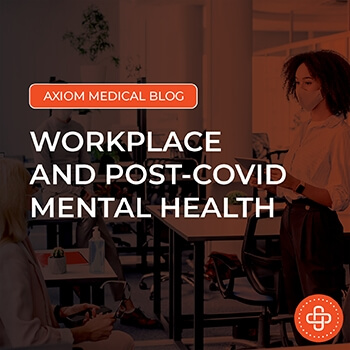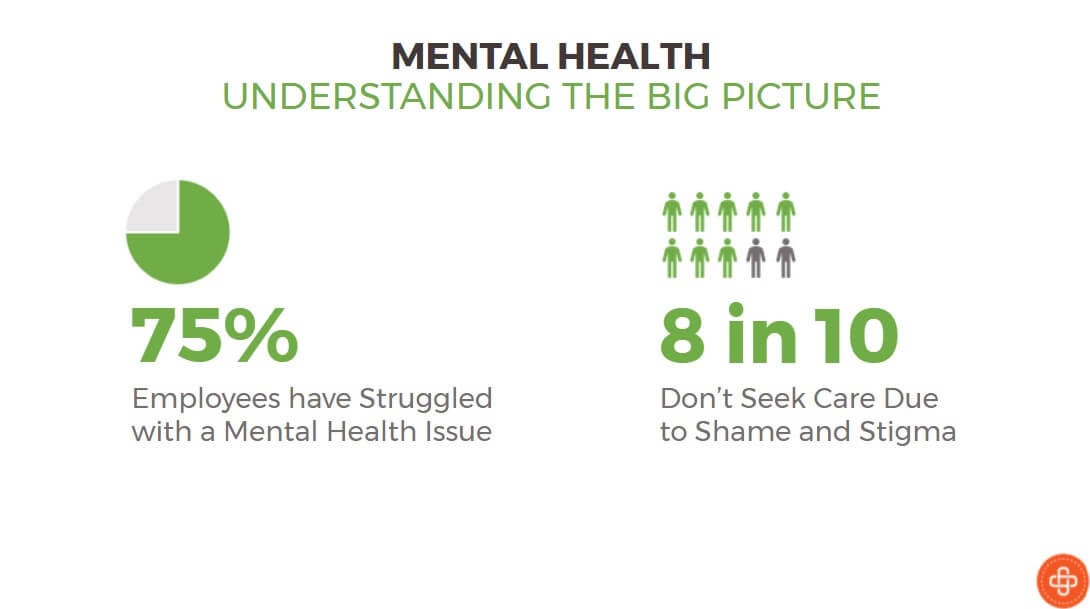The coronavirus pandemic has affected workplace population health and the workforce’s mental health negatively. Workplace and post-COVID mental health have been brought to our attention, following COVID-19 survivors being diagnosed with mental illness after recovering from the disease. 
A physiological study on COVID-19 patients reveals that one in five or 20% of infected individuals have been diagnosed with a psychiatric disorder within 90 days of being diagnosed with COVID-19. Some of the most common symptoms are anxiety, depression, and insomnia. While recovered COVID-19 patients reported these symptoms, their families and close contacts have also experienced similar mental health problems, the study reported.
What Do Researchers Have To Say?
The researchers from Britain’s Oxford University mentioned that many recovered patients are at significantly higher risks of dementia, a sub-acute brain impairment condition. Another study, conducted and published in The Lancet Psychiatry journal, analyzed the electronic health records of 69 million people in the USA. The data also includes 62,000 cases of COVID-19. The research reports show similar findings on the mental health of those afflicted by COVID-19 worldwide. Within three months after testing positive for COVID-19, at least one in every five survivors reported anxiety and depression. According to the researchers, the number is about twice the number of patients monitored in the same period. The study mentioned people with a pre-existing mental illness are at higher risk of developing post-COVID-19 anxiety. Mental health specialists now have evidence supporting the claim of COVID-19 putting patients at risk of psychiatric illness and affecting their brain and mind in the long run.
Major Causes Of Workplace and Post-COVID Stress:
Without a doubt, the COVID-19 pandemic has had a significant impact on both population health and workplace health. Uncertainty over job loss, health-related stress, and public health concerns, and adjusting to remote working schedules altogether, make our lives stressful and overwhelming. Due to the pandemic, your workforce has had many such significant lifestyle changes, often causing strong emotional impact and triggering psychological stressors. Social distancing and lack of in-person interactions also negatively impact our overall mental health.
Here are some primarily responsible factors for the workplace and post-COVID stress.
Workplace COVID Stress factors include:
- Employment and financial uncertainty
- Pandemic personal and public health concerns
- Concerns about getting exposed to the virus at work
- New work schedules due to remote working
- Adapting to a new, socially distanced work and personal lifestyle
Post-COVID Stress can be due to:
- Physical and mental stress after recovering from the disease
- Dealing with a financial burden due to COVID-19 hospitalization
- Lack of access to the vaccines
- Dealing with personal loss due to COVID-19
Physical Effects of Illness:
Some of the common symptoms include:
- Lack of motivation
- Feeling tired, exhausted, and consistently overwhelmed
- Anxiety and insomnia
- Feeling nervous or anxious
- Consistently sad or depressed
- Difficulty in focusing

When Should You Act?
Only 2 out of 10 individuals seek professional help for mental illness and stress-related problems. That means 75% of the affected individuals struggle with a mental and emotional health issue and don’t seek care due to the fear of social shame and stigma. Employees usually hide mental illness in the workplace due to the fear of losing a job and not jeopardizing workplace reputation and relationships.
Untreated mental illness cases can lead to:
- Prolonged sleeplessness and severe insomnia
- Twice the risk of developing heart disease and diabetes
- Missed workdays due to mental health-related issues
- Depression and suicide
Experts always advise to reach out to a psychologist or psychiatrist for stress and anxiety. Take immediate action for emergency situations and call 911 to seek help.
How Can Employers Help?
Employers may consider introducing an Employee Assistance Program (EAP) to help their employees dealing with mental illness. Here are some suggestions on how employers can help employees to deal with post-COVID stress.
- Introduce adjustable sick-leave policies for employees
- Offer flexible work schedule
- Offer first-aid care through virtual or telephonic healthcare
- Active communication
- Applying evidence and taking action
- Encouraging employees to participate and utilize EAP programs
Here are some helpful blog posts on workplace mental health.
Workplace Pandemic Anxiety – Five Ways To Support Your Employees?
Top Seven Employee Suicidal Signs
Watch our on-demand webinar video on Workplace and Post-COVID Mental Health!
Click Here
With over 20+ years of experience in employee health and safety programs, Axiom Medical can help employers with COVID-19 Safety and Compliance Programs. We specialize in COVID-19 screening, employee contagious respiratory illness assessment, CheckIn2Work daily attestation, and employee vaccination programs with onsite COVID-19 vaccine administration. As a part of our COVID-19 Response Program, our HSS compliance officers and nurse testers oversee the onsite testing and workplace safety implementation processes.
Contact Us
Click Below For Our FREE COVID Vaccine Guide!

With a career focused on digital marketing, Chitra is a specialized SEO-Content marketer. After moving from biotechnology to business operations and marketing, Chitra started her digital marketing career as a freelance content developer and technical writer. With Axiom, as a content marketing & SEO specialist, she is passionate about creating informative marketing copies for optimum search engine performance.
Find out more about our Tempo Live Behavioral Health and Injury Case Management services.











